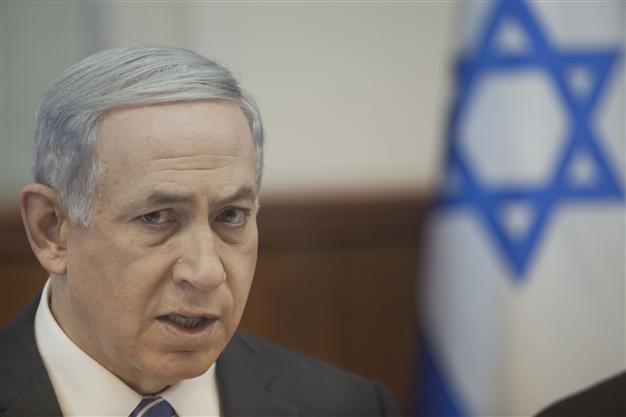Israel PM rejects 'dictates' as France's top diplomat visits
JERUSALEM - Agence France-Presse

AP Photo
Israeli Prime Minister Benjamin Netanyahu on June 21 rejected "international dictates" ahead of a visit by France's top diplomat, with Paris advocating a UN resolution laying out parameters for peace talks.With negotiations between Israel and the Palestinians stalled for more than a year, French Foreign Minister Laurent Fabius was to hold separate talks with Israeli and Palestinian leaders Sunday in a push to revive talks.
France has argued in favour of a UN resolution that would guide negotiations leading to an independent Palestinian state and which could include a timeframe for talks.
But ahead of Fabius's arrival in Jerusalem, Netanyahu hit out at international diplomatic efforts to impose proposals which he said had so far neglected to address vital Israeli security concerns.
"The only way to reach an agreement is through bilateral negotiations, and we will forcibly reject any attempts to force upon us international dictates," Netanyahu said at the weekly cabinet meeting, in comments quoted by his office.
"In the international proposals that have been suggested to us -- which they are actually trying to force upon us -- there is no real reference to Israel's security needs or our other national interests.
"They are simply trying to push us into indefensible borders while completely ignoring what will happen on the other side of the border."
Fabius, during a visit to Cairo on June 20, urged the resumption of Middle East peace talks, while warning that continued Israeli settlement building on land the Palestinians want for a future state would damage chances of a final deal.
Peace talks between Israel and the Palestinians have been comatose since a major US push for a final deal ended in failure in April 2014.
Israel says the process failed because the Palestinians refused to accept a US framework document outlining the way forward.
But the Palestinians blame the collapse on Israel's settlement building and the government's refusal to release veteran prisoners.
The relationship between the two sides remains severely strained, prompting the Palestinians to step up efforts on the international stage to seek their promised state.
Such efforts have included a push to open criminal proceedings against Israel before the International Criminal Court.
Tensions have been high and on Sunday a Palestinian stabbed and seriously wounded an Israeli border policeman outside Jerusalem's Old City, with the officer managing to shoot his attacker, leaving him in critical condition.
It was the latest in a string of lone-wolf attacks which have gripped the city and spread to the West Bank in the past nine months, which the security forces have been largely powerless to prevent.
The United States has consistently defended Israel before the UN Security Council and any French resolution must be accepted by Washington to avoid a veto.
President Barack Obama's administration has however recently signalled that it could be swayed given Netanyahu's recent comments regarding a Palestinian state.
Netanyahu sparked international concern when he ruled out the establishment of a Palestinian state while campaigning for the March 17 general election, though he later backtracked on the comments.
Obama said in a recent interview with Israeli television that a lack of progress in peace talks would make it "more difficult to argue with those who are concerned about settlement construction, those who are concerned about the current situation."
France's diplomatic efforts also come against the backdrop of negotiations with Iran over its nuclear programme, with Israel firmly opposing the deal currently on the table.
Iran and the P5+1 powers -- Britain, China, France, Germany, Russia and the United States -- agreed in April on the main outlines of what would be a historic agreement scaling down Tehran's nuclear programme.
The world powers and Iran set themselves a deadline of June 30 to finalise what would be a highly complex accord, and negotiators have been meeting regularly in Vienna and elsewhere in recent weeks.
Some have argued that a window of opportunity may arise after the conclusion of the Iran talks for France to submit a resolution at the UN.
They argue that the United States would be unlikely to support moves beforehand that could impact negatively on the nuclear negotiations.
















